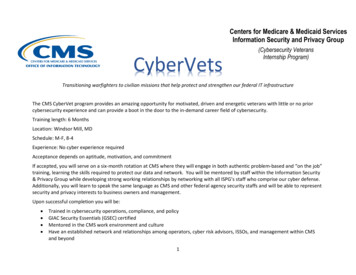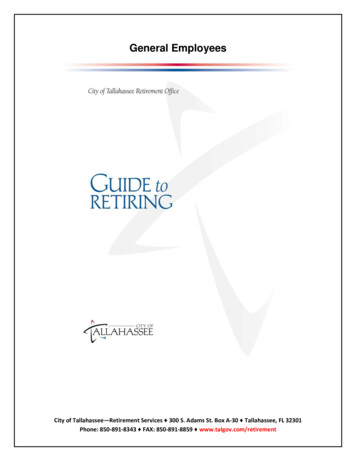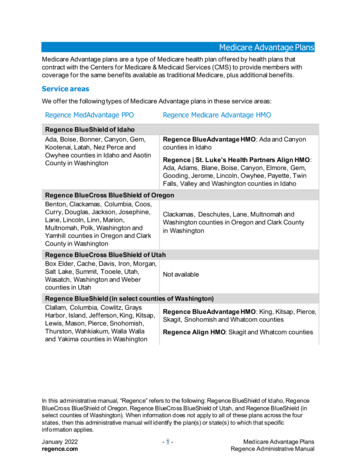
Transcription
Centers for Medicare & Medicaid ServicesInformation Security and Privacy GroupCyberVets(Cybersecurity VeteransInternship Program)Transitioning warfighters to civilian missions that help protect and strengthen our federal IT infrastructureThe CMS CyberVet program provides an amazing opportunity for motivated, driven and energetic veterans with little or no priorcybersecurity experience and can provide a boot in the door to the in-demand career field of cybersecurity.Training length: 6 MonthsLocation: Windsor Mill, MDSchedule: M-F, 8-4Experience: No cyber experience requiredAcceptance depends on aptitude, motivation, and commitmentIf accepted, you will serve on a six-month rotation at CMS where they will engage in both authentic problem-based and “on the job”training, learning the skills required to protect our data and network. You will be mentored by staff within the Information Security& Privacy Group while developing strong working relationships by networking with all ISPG’s staff who comprise our cyber defense.Additionally, you will learn to speak the same language as CMS and other federal agency security staffs and will be able to representsecurity and privacy interests to business owners and management.Upon successful completion you will be: Trained in cybersecurity operations, compliance, and policyGIAC Security Essentials (GSEC) certifiedMentored in the CMS work environment and cultureHave an established network and relationships among operators, cyber risk advisors, ISSOs, and management within CMSand beyond1
CyberVets is a six-month program for transitioning veterans who are interested in making a career in federal cybersecurity. It isbased on a proven cognitive apprenticeship problem-based learning model that prepares you to solve real problems in real contextsusing real tools. It leverages the National Initiative for Cybersecurity Education Framework with attained KSAs (knowledge, skills, andabilities) aligned to work roles including those of Cyber Defense Analyst and Information Systems Security Officer/Manager.The program is open to all interested applicants regardless of prior career field or experience.In Summer 2020 (watch for actual date), four successful applicants will begin the program with the addition of two additionalsuccessful applicants integrated into the program at eight-week intervals. This facilitates cooperative and collaborative problemsolving as the new learners are integrated into the problem-solving framework.Goals of the program:1. Preparation to enter cybersecurity workforce positions in civilian government services2. Attain the knowledge, skills, and abilities (KSAs) for cybersecurity and privacy principles based on appropriate NationalInstitute for Cyber Education (NICE) Work Roles3. Use data collected from a variety of cyber defense tools (e.g., alerts, firewalls, network traffic logs) to analyze events thatoccur within their environments to mitigate threats4. Understand and be able to help perform the activities required to support information system security processes andprocedures5. Gain confidence and expertise in communicating problems, solutions, status and project attributes at multiple levels (i.e.,technical, peer, executive)6. Provide the basic and intermediate learning foundations to begin and build a successful career in cybersecurity.2
Areas of learning:The program begins with a solid foundation in networking fundamentals and network security essentials and will progress into moreadvanced areas such as reverse engineering, threat management, policy, and compliance management. Candidates will develop theskills and confidence necessary for exploring modern cybersecurity theories thru hands-on learning experiences and to communicatethreat status to senior leadership. Candidates will also be trained in the following but not limited areas: Critical thinking and problem solvingResearching cyber security methods and trendsNetworking Essentials (foundations to advanced)Windows and Linux Security EssentialsNetworking VulnerabilitiesReverse EngineeringNetworking and analysis toolsDefense-in-Depth StrategiesThreat Management, Risk Management and ResponseContinuous Diagnostics and Mitigation (CDM)Forensics, Malware, and AnalysisPenetration Testing BasicsRisk management and oversightProgram Expectations:Application and selection process:1. Applicants will be chosen by the following:a. Resumeb. Interviewc. Aptitude (non-cybersecurity specific), motivation, and commitmentd. Problem solving ability3
Training methodologies:1. The course is a cognitive apprenticeship problem-based learning model that will prepare you to solve real problems in realcontexts using real tools.2. Course work will be 80% hands-on learning. Candidates will learn mostly through problem solving scenarios. Candidates willlearn and develop their own research and learning skills to apply to these scenarios. Teach you to teach yourself.3. Candidates will have multiple mentors to amplify and enhance learning objectives.Administrative:1. Course will be Monday-Friday, 8am-4pm, with the exception of holidays.2. Attire for the program will be casual and according to the CMS dress policy)3. In order to maximize program and learning effectiveness, candidates are expected to be present throughout the six-monthprogram. The course will have administrative days built into it so allow candidates to take care of necessary appointment andout-processing duties.4. The program will have multiple check points throughout the course to assess the apprentice’s performance and aptitude. Ifthe apprentice is not meeting expectations, they will be counseled on performance. If the apprentice does not meetstandards but each checkpoint, they will be removed from the program.4
Course OutlineWeek NumberDomainTopicPre courseAdmissionApplication process0Orientation/Pre-testOnboarding and Pre-testing1OperationsIntro to Security OperationsCenter (SOC) AnalyticalMethods, Networks andVirtual Machines2OperationsIntro to SOC AnalyticalMethods, Ports, OSFingerprinting3OperationsIntro to SOC AnalyticalMethods, reverseengineering methods, tools,programming languages4OperationsIntro to SOC AnalyticalMethods, ExecCommunications5OperationsLinux SecurityEssentials/Applied NetworkSecurity6OperationsSOC Tools and Tour5
7Policy/ComplianceIntro to information systemssecurity officer role (ISSO)and appropriate policy8ComplianceIntro to CFACTS9OperationsAccess Controls, SecurityArchitecture, RiskManagement, CMSSOC Tools,Signatures10OperationsSANS SEC 401 NetworkSecurity Essentials11OperationsSANS SEC 401 Defense-inDepth and Attacks12OperationsSANS SEC 401 ThreatManagement13OperationsNetwork Security Advanced/Windows Enterprise Security14Policy/ComplianceAdvanced CFACTS - Reporting15Policy/ComplianceISSO/ISSM Concepts andprocesses –Assessments/Audits16OperationsVulnerability Analysis Tools(VAT)6
17OperationsForensics, Malware Analysis,Tools18OperationsPenetration Testing19OperationsSANS SEC 401 Cryptography,Risk Management, andResponse20OperationsSANS SEC 401 WindowsSecurity21OperationsSANS SEC 401 Linux Security22Policy/ComplianceIntro to Cyber Risk Advisor,Expiring Authorization toOperate Intro to Cyber Risk Advisor,Expiring Authorization toOperate Scenario/ExecutiveCommunicationGSEC st-testingGSEC7
Critical thinking and problem solving . Access Controls, Security Architecture, Risk Management, CMSSOC Tools, Signatures . 10 . Operations . SANS SEC 401 Network . SANS SEC 401 Cryptography, Risk Management, and Response . 20 : Operations . SANS SEC 401 Windows Security : 21 .











